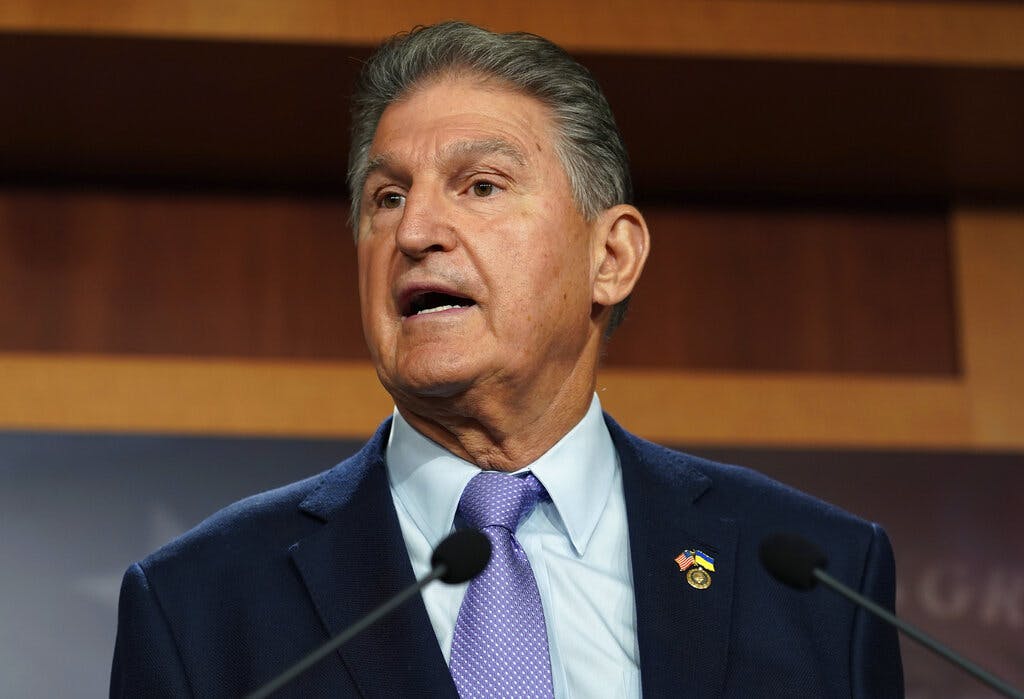Manchin Could Have a Major Impact on 2024 Election, a New Poll Suggests
Were the West Virginian to run, he could garner enough support to send the 2024 presidential election to the House for the first time in 200 years.

A new survey suggests that a presidential bid by Senator Manchin could deliver the presidency to President Trump or potentially trigger an arcane procedure known as a contingency election.
The survey, from Echelon Insights, found that in a head-to-head matchup against both Mr. Trump and Governor DeSantis, President Biden would enjoy an advantage.
In the horse race between Messrs. Trump and Biden, the two garnered 44 percent and 46 percent support from respondents, respectively. In the matchup between Messrs. DeSantis and Biden, the candidates received 42 percent and 46 percent support, respectively.
While these findings challenge Mr. DeSantis’s electability argument and suggest that Mr. Biden enjoys a modest advantage heading into the summer before primary season, the outlook shifts when Mr. Manchin is introduced as a third-party candidate.
The poll finds that in a three-way matchup, Messrs. Trump, Biden, and Manchin would enjoy 42 percent, 41 percent, and 9 percent support, respectively. In a three-way matchup involving Messrs. DeSantis, Biden, and Manchin, the candidates would garner 38 percent, 42 percent, and 8 percent support, respectively.
These are some of the first numbers from a major pollster regarding support for a potential third-party or independent bid by Mr. Manchin, and, as analysts predicted, he doesn’t seem to have a strong core constituency.
What Mr. Manchin does appear to have is the backing of the well-funded nonpartisan group No Labels, which has launched a campaign to get on ballots across the country as a contingency plan for a potential rematch in 2024 between Messrs. Biden and Trump.
The group is already on the ballot in some key states like Arizona, but hasn’t yet achieved this first step in enough states to carry the Electoral College. Still, some Democrats have expressed anxiety that the group is looking to play the spoiler in 2024, a feeling that appears to be backed by polling, according to Echelon Insight’s findings.
Despite these worries, Mr. Manchin has maintained that he will refuse to play the spoiler in 2024 or beyond, even as he makes trips to early primary states like Iowa.
Even a particularly strong performance by Mr. Manchin would leave him a long way from the support needed to win a majority in the Electoral College, with most of his support coming from likely Democratic voters.
There is one way that Mr. Manchin could potentially make his hypothetical long-shot bid for the presidency more appealing to Republican voters, according to a data scientist at Decision Desk HQ at Washington University in Saint Louis, Liberty Vittert.
Ms. Vittert tells the Sun that Mr. Manchin’s best shot is “with a Republican on the ticket.”
“If you could get a Manchin/Youngkin ticket they wouldn’t have a great chance at winning, but they could take enough electoral votes away to make it a contingency election,” Mr. Vittert says.
Outlined by the 12th Amendment, a contingency election is the procedure for selecting a president when no candidate receives a majority of the vote in the Electoral College. Under this scenario, the House would be required to select the president and the Senate would select the vice president. While each senator gets a vote in the vice presidential election, votes are cast in the House not by individual representatives but by House delegations.
Delegations are left to determine who they will cast their votes for by themselves and they are allowed to choose from the top three electoral vote-getting candidates.
In contingency elections, the House delegations continue casting ballots until the president is selected in much the same way that the House chooses a speaker. The winning candidate must receive an absolute majority of each delegation’s votes.
This means that 26 of the 50 delegations must support the winning candidate if and when all delegations are voting. Like in the House speaker election, delegations may vote absent in order to lower this threshold.
Although uncommon, America has selected a president via contingency election before — in 1800 and again in 1824. In 1800, President Jefferson was elected after 35 ballots. In 1824, the son of the second president, President John Quincy Adams, was elected via contingency election in what President Jackson later branded the “corrupt bargain.”

